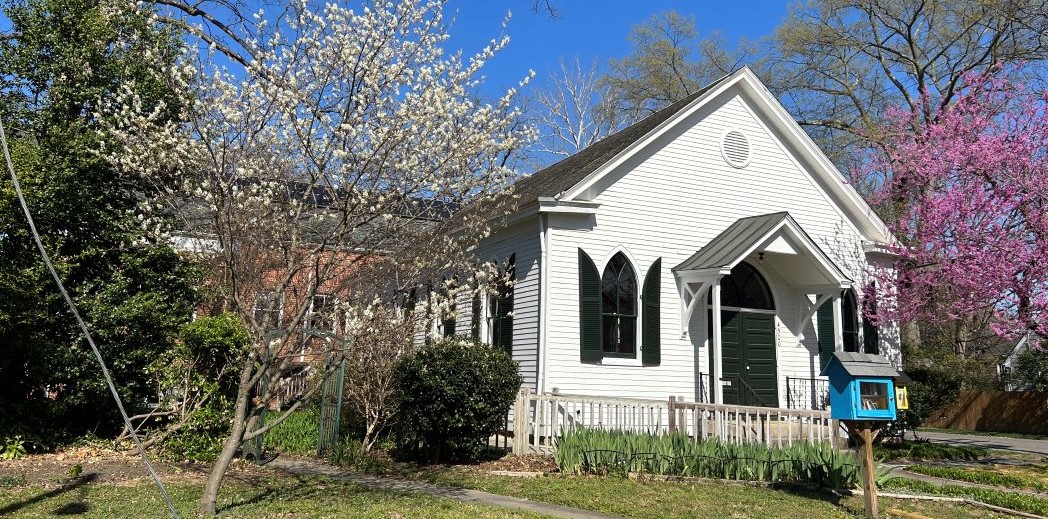Friends affirm a Biblical basis for the peace testimony. A Prince of Peace was prophesied who would bring in a Peaceable Kingdom. “Thou shalt not kill” is one of the Ten Commandments. Jesus taught and lived peacemaking and love of enemy. George Fox similarly counseled his followers “to live in the life and power which does away with the occasion for war.”
The material below was prepared earlier by Mary Fran Hughes-McIntyre and is excerpted from her History of Richmond Friends Meeting, 1795-1962, available in the Meeting Library. (or here:THE HISTORY OF RICHMOND FRIENDS MEETING 1795-1962)
Living Out the Peace Testimony
Friends affirm a Biblical basis for the peace testimony. A Prince of Peace was prophesied who would bring in a Peaceable Kingdom. “Thou shalt not kill” is one of the Ten Commandments. Jesus taught and lived peacemaking and love of enemy. George Fox similarly counseled his followers “to live in the life and power which does away with the occasion for war.”
Early Richmond Friends were firm pacifists, disowning from membership those who bore arms. Doubtless knowing Friends from Cedar Creek Meeting who had firmly refused to fight during the Revolutionary War, Friends in Richmond affirmed a pacifist stand in the War of 1812. Friends suffered payment of muster fines rather than fight. As part of Virginia Yearly Meeting, they concurred with the following statement:
While we view with sorrow the awful progress of war spreading desolation and Misery in the human family, let us endeavor to guard our Minds from mixing in the politics of the times, which will insensibly leven into the spirit, and will lead if not to the practice at least to the promotion of that destructive evil.
During the War between the States, some Richmond Friends chose to fight, and some were conscientious objectors. Cedar Creek Monthly Meeting (of which Richmond Friends became a part in 1841) accepted the resignation of three persons who chose to fight, but “earnestly hopes that the day is not distant when those with many others aroused by the awful juncture of war now presented to our view may be enabled to renounce principles which lead to such results and enlist under the banner of the Prince of Peace.”
In the period from 1914-1920 the Peace Committee of Richmond Friends meeting was particularly active workingfor peace and reconciliation in the period of the Great War. Peace literature was distributed in the schools, and prizes were offered in 1916 for the best essays on “Why We Do Not Need a Large Increase in our Army and Navy”: $15 first prize to a boys’ school, $10 first prize to a girls’ school. (Editor: Friends have not been free from societal sexism and racism.) Money was donated for Belgian relief in 1914, for English and Armenian relief in 1916, for French orphans in 1917, and for feeding the German children in 1920. Letters were sent to Senators and Representatives in 1916 urging opposition to the so-called “preparedness” for war. The Friends Peace Committee ran two advertisements in the newspapers, including the following:
PEACE OR WAR?
To our fellow-citizens:
In this time of crisis when our country’s highest good is the common aim of all, we voice this deep conviction of patriotic duty.
The causes for which men fight—liberty, justice, and peace—are noble and Christian causes. But war itself violates law, justice, liberty and peace, the very ends for which alone its tragic costs might be justified…
In World War II, Friends were again active in peace-making. Member Hoge Ricks met at homes in 1940 with young Friends to think through their stands on the peace testimony in anticipation of their being faced with conscription. After the war opposition to conscription continued, with visits to Congressional Representative, and a firm stand against the Selective Service Act of 1948.
A change in Friends’ custom of disowning those who bear arms in evident in 1943. A member wrote saying that he had joined the Armed Forces as a result of personal conviction, and that he doubted the Meeting wanted his membership. The Meeting decided to stay in touch with him, since “to encourage him would do more that to ostracize him.”
(Richmond) Friends were proud of having several members, who were conscientious objectors, serving in Civilian Public Service Camps. Their peace testimony was affirmed.
Thus, Richmond Friends stood consistently against war, and dealt in increasingly lenient ways with Friends who chose to fight.
* * * *
(Editor: During World War II, some 12,000 men who were conscientious objectors to war, served in non-military occupations across the U.S. Under the leadership of Mennonite, Quaker and Church of the Brethren agencies, they were engaged in mental health care and medical experiments, in forestry and diary farming, and in other important civic projects.)
